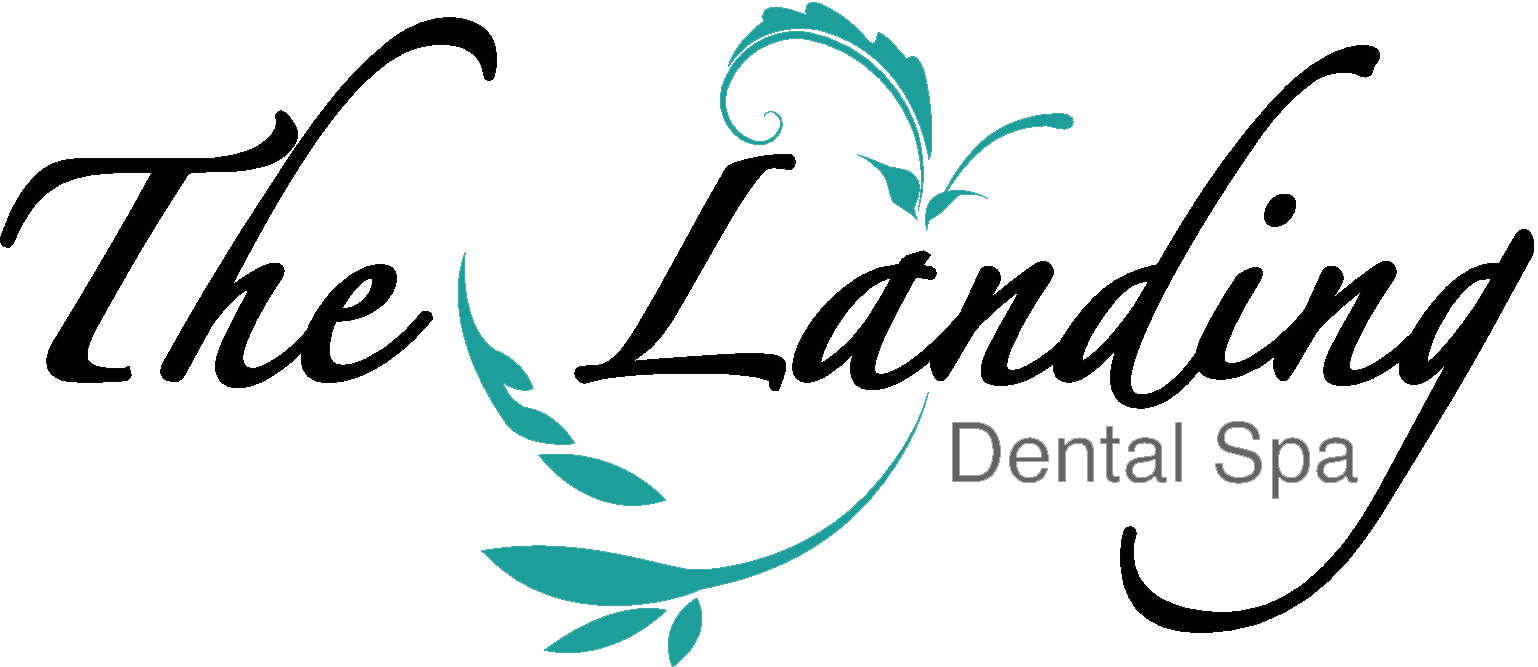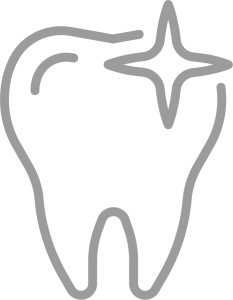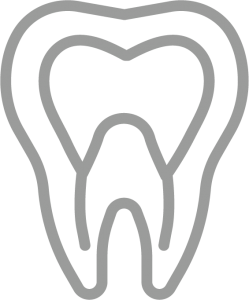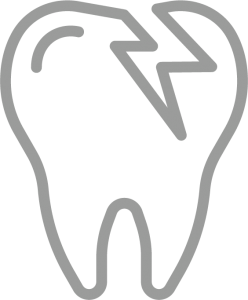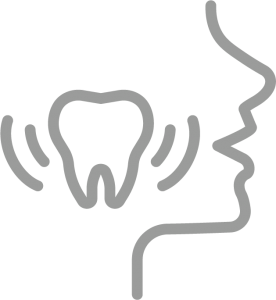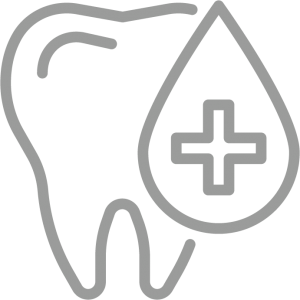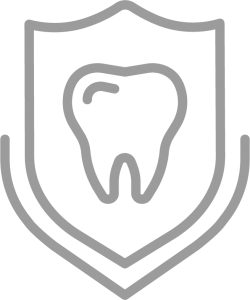1
Services
TABLE OF CONTENTS
- Structure of the Tooth
- Dental Exams and Cleanings
- Teeth Whitening
- Cosmetic Procedures: Botox & Dermal Fillers
- Invisalign
- Family Dentistry
- Crowns
- Treatment of Gingivitis and Gum Disease
- Dental Emergencies
- Dental Fillings
- Bridges
- Extractions
- Occlusal Guards
- Root Canal Therapy
- Sealants
- Partial & Complete Dentures
- Veneers
The Landing Dental Spa accommodates all of its patients with full-service cosmetic and family dentistry. Located in Morgantown, West Virginia, our relaxing environment is sure to calm and soothe you as you are adequately treated. Our services range from dental exams, cleanings and teeth whitening to cosmetic procedures like Botox and dermal fillers to dental emergencies, gum disease treatment, root canals and more.
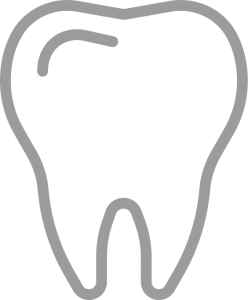 STRUCTURE OF THE TOOTH
STRUCTURE OF THE TOOTH
A person’s tooth is structured in two parts: the crown (covered with enamel) and the root (embedded in the jaw).
Then, there is the makeup of the tooth, including:
- Enamel: the hard shell layer on the crown. It is the hardest substance on the body.
- Dentine: the substance that makes up the majority of the tooth. If the enamel is lost, your teeth can become sensitive.
- Pulp: extends between the crown and the tip of the root and is the soft tissue that contains blood and nerve supply to the tooth.
- Cementum: a layer of bone-like tissue that covers the root.
Surrounding the teeth includes the following structures:
- Gums: soft tissue that surrounds the teeth and bone.
- Periodontal ligament: thousands of fibers that fasten the cementum to the socket.
- Bone: provides support to the roots of the teeth
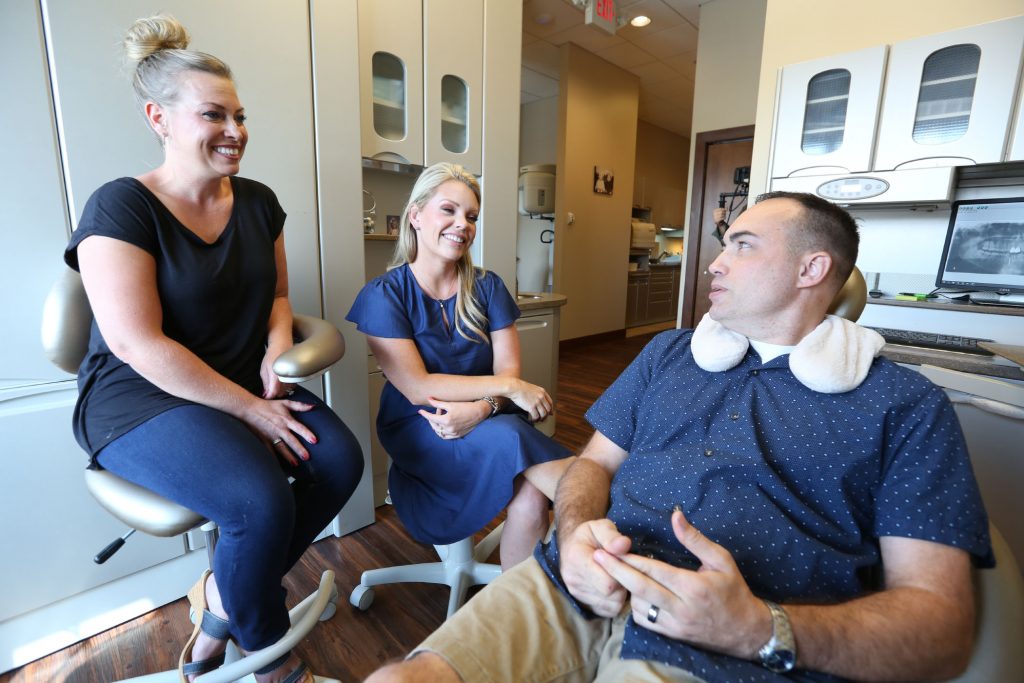
Dental exams are an essential part of preventive dental care. Preventive dentistry is the practice of taking care of your teeth to keep them happy and healthy. Preventive dentistry aids in the avoidance of cavities, gum disease, enamel wear, gingivitis and periodontitis. It is especially important for children to take part in preventive dentistry as it can help them learn lifelong dental health habits. To encourage healthy teeth habits, it is recommended that all individuals schedule regular check-ups with their dentist; typically every six to 12 months.
To prepare for your first dental exam or if you are looking for a new dentist, you may want to think about the dental office location, if they are in your health insurance plan and if not, payment options.
At The Landing Dental Spa, we understand that you may feel anxious about going to the dentist. It is a normal reaction; however, it is our goal to help our patients feel as comfortable as possible, which is why we offer many complimentary amenities such as heated massage chairs, WiFi internet, heated neck pillows, soothing spa music, warm blankets, personal flat-screen TVs and much more!
During a dental exam, your dentist will examine your teeth for cavities, gum disease, gingivitis, as well as perform teeth cleanings.
The dental exam may include x-rays (if needed), examining your face, neck and mouth for any risk of future oral issues, as well as the normal discussion of dietary and oral hygiene habits, how to properly brush and floss and any potential future cosmetic improvements to your teeth.
After your dental exam, your dentist will talk with you about your oral health, including any future risks of oral health issues. Your dentist may also go over preventive measures that you could be taking to improve your overall oral health.
The thickness and smoothness of your teeth’s enamel are affected by your genes. If you have thinner enamel it will be much easier for your teeth to stain. Additionally, enamel contains pores that can pick up stains and pellicle, a thin coating, can form on your teeth, which will also pick up stains.
Teeth whitening is the process of lifting the color from your teeth. The most common reasons that your teeth can become yellow include:
- Utilizing tobacco products
- Drinking acidic beverages like black tea and coffee, dark and light sodas and white and red wine
- Eating foods like berries, tomatoes, curries and soy sauces
- Having poor oral health habits
Who Shouldn’t Get Their Teeth Whitened?
Women who are pregnant should not have their teeth whitened.
Your Whitening Procedure
Before your procedure, your dentist will:
- Take before pictures of your teeth so that they can monitor your teeth’s progress.
- Clean your teeth to remove bacteria, food or other substances.
Then your dentist will start the type of whitening treatment. With teeth whitening, there are two types of procedures: vital and non-vital.
The vital whitening is the most common type of whitening. For an in-office procedure, your dentist will have the ability to use stronger whitening gel, and a specialized light that allows the bleaching to happen quicker. This procedure is a 30 to 90-minute procedure and it is recommended that you make one to three appointments.
The non-vital whitening is a procedure that is done on a dead tooth that has had a root canal. It is used to treat intrinsic staining on teeth.
Side Effects
There are typically no severe side effects; however, you may feel sensitivity in your teeth or have mild gum irritation.
Teeth whitening is not permanent and it is recommended that you schedule follow-up appointments.

Botox
Botox is used to primarily treat facial wrinkles. Injections block chemical signals from the nerves in the targeted area. This signals the muscles to stop contracting and relax.
During this procedure, a thin needle will be used to inject Botox into the targeted area. The number of injections will be based on the size of the area being treated. You will be able to resume normal activities after having this procedure; however, patients are encouraged to avoid rubbing or touching the area, avoid heavy exercise for 24 hours and remain in an upright position for six hours.
Results can last between three to four months. To maintain the results, follow-up injections will need to be scheduled.
Dermal Filler
A dermal filler is a gel-like substance that is injected into the skin to restore volume, smooth lines and enhance facial features. At The Landing Dental Spa, we use Juvederm and Radiesse, which are both Hyaluronic Acid (HA). Hyaluronic Acid (HA) is a naturally occurring substance found in the body that helps your cells retain moisture. HA fillers are soft and gel-like. Results of HA fillers are temporary and only last six to 12 months before the body absorbs them.
Invisalign is a clear aligner alternative to metal braces for teens and adults. This alternative gives you the ability to have a better, brighter smile without needing braces
During an Invisalign appointment, we will take a digital scan of your mouth and develop a custom treatment plan based on those scans. After taking a scan of your mouth, we will send the scans off to be made and give you a follow-up appointment to pick up your aligners.
Is there a difference between Invisalign and other clear aligners?
|
Invisalign aligners:
|
Other clear aligners:
|
At The Landing Dental Spa, we want to take care of the whole family. Preventive oral care starts as a child, and we believe that healthy oral habits that start early will continue throughout an individual’s life.
During a pediatric appointment, we will provide a comprehensive report, including:
- Oral exams
- Cleanings
- Assessments for straightening teeth or correcting bites
- Cavity repairs
- Repairing dental injuries (broken teeth)
A crown, otherwise known as a dental cap, is a restoration procedure that completely encompasses a tooth or implant. Crowns are typically needed when a cavity is too large to fix and is threatening the health of the tooth.
There are many different types of crowns, including:
- Stainless steel
- Metals
- Porcelain-fused to metal
- All-resin
- All-ceramic or all-porcelain
- Temporary crowns vs permanent crowns
Your dentist will discuss with you what type of crown is best for your situation.
Preparing you for a crown typically requires two appointments.
During your first visit, your dentist will:
- Examine your tooth and take x-rays.
- Numb your tooth and the gums around it.
- File down the tooth so that the crown can fit around it.
- Use a paste to make an impression of the tooth.
- Send the impression of the tooth for the crown to be made.
A temporary crown is put over the tooth until your more permanent crown is delivered. While you have a temporary crown, you should avoid sticky, chewy food, minimize the use of the side of your mouth and avoid chewing hard foods.
During your second visit, your dentist will:
- Take off the temporary crown.
- Apply an anesthetic to the tooth and gums around it.
- Apply the new crown.
Gingivitis is a form of gum disease that occurs when plaque builds up on teeth and causes inflammation around the gums. Pore oral care habits, smoking, old age, dry mouth, poor nutrition habits, genetics and medical conditions can also cause gingivitis. Symptoms of gingivitis include:
- Swollen gums
- Dark red gums
- Gums that bleed easily
- Bad breath
- Receding gums
- Tender gums
Untreated gingivitis can lead to tooth loss. If you notice any of the above symptoms, it is time to schedule a dental appointment. The sooner you seek care, the better chance you have at reversing any damage.
Oral accidents do happen. Knowing what to do can mean the difference between keeping a tooth and losing it.
For a knocked out tooth, keep the tooth moist at all times. If you can, place the tooth back into the socket without touching the root. However, if this is not possible, place the tooth between your cheek and gums or in milk. Then, go to your dentist’s office immediately.
For a cracked tooth, rinse out your mouth with warm water and then put a cold compress on your face to keep the swelling down.
When you have a dental emergency, it is important to call your dentist’s office right away. To prevent dental emergencies:
- Wear protective mouth guards when participating in sports.
- Avoid chewing hard foods like ice.
- Don’t try to open or cut things with your teeth.
A dental filling is a method used to restore teeth back to their normal function and shape. There are many different types of fillings:
- Gold fillings: may last up to 20 years and are the most expensive fillings to get
- Silver fillings: inexpensive filing, resistant to wear and are typically used for back teeth
- Plastic fillings: may last three to ten years, isn’t resistant to wear
- Porcelain fillings: resistant to staining and is similar in cost to gold fillings
When getting a filling, your dentist will remove the decay from the tooth and clean the area. Then, the area will be filled with one of the above types of fillings.
Dental bridges bridge the gap between one or more missing teeth. A bridge is made up of one to two crowns that are placed on either side of the gap and will anchor the teeth. Then a false tooth will be placed in between.
Unfortunately, pulling a tooth may be necessary for some patients. For example, if a tooth is badly damaged or infected, it will need to be pulled.
If you have had or have one of the following procedures or conditions, you need to tell your dentist before receiving an extraction:
- Man-made heart valves
- Damaged heart valves
- Impaired immune system
- Liver disease
- Artificial joints
- History of bacterial endocarditis
Before, During and After a Procedure
Before the procedure, your dentist will inject an anesthetic to numb the area. During the procedure, your dentist will take out your tooth. After the procedure, the area will be packed with gauze to help stop the bleeding.
After the extraction, make sure to follow all of the follow-up care procedures including:
- Take prescribed painkillers.
- Bite down firmly on the packed gauze.
- Change the gauze after it is soaked with blood.
- Apply an ice bag to the area after the procedure for 10 minutes at a time.
- Relax for 24 hours.
- Avoid rinsing or spitting for 24 hours.
- After 24 hours, rinse your mouth out with a ½ teaspoon salt and 8 ounces of warm water solution.
- Avoid drinking from a straw.
- Do not smoke.
- Eat soft foods.
- Continue to brush and floss your teeth, but avoid the area.
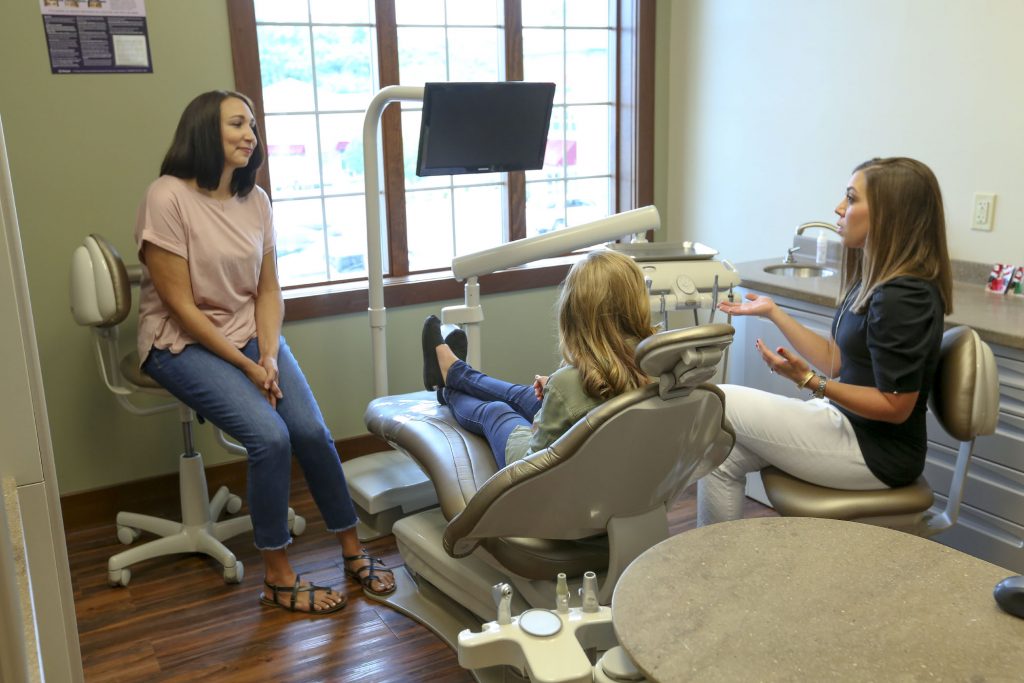
Occlusal guards are removable mouth guards that help prevent wear and tear on your teeth during the night. If you find yourself grinding your teeth during the night, you may need a mouth guard.
A root canal treatment is a straightforward procedure to relieve dental pain. During your treatment, the pulp in your teeth will be removed, then the area will be cleaned and disinfected. Then, a filling in placed to seal the area.
A dental sealant is a thin, plastic coating painted on the chewing surfaces of the teeth to prevent tooth decay. It is recommended that children six to 14 years of age should receive dental sealants. Sealants can protect teeth from decay for up to 10 years.
Partial dentures are a removable denture that consists of replacement teeth that are attached to gum-colored plastic.
Complete dentures are made after all of the teeth have been removed and the gums have begun to heal, typically eight to 12 weeks after the removal procedure.
Veneers are thin coverings that are placed on the front part of the teeth. Veneers look natural and can correct a variety of dental problems including teeth that are stained, chipped or worn.
PAYMENT OPTIONS
We are preferred providers for Delta Dental United Concordia and MetLife. We will be happy to file to other benefits providers as a convenience to you.
Other payment options
Care Credit is an affordable payment plan option offered by a third party with low-interest rates and no prepay penalties. Learn more & apply at www.carecredit.com. We offer a 10 percent discount for payment in full at the time of service for treatments $1,000 and above.
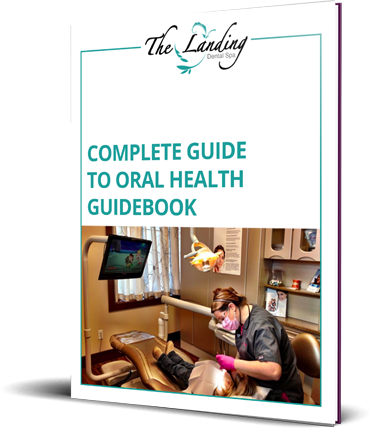
Download our free Complete Guide to Oral Health guidebook
